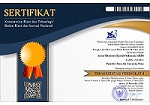Teori Perilaku Konsumen Perspektif Ekonomi Islam
Abstract
Islam is a religion that regulates all human behavior, whether it is human behavior with Allah (hablum minallah) and human behavior with humans (hablum minan nas). Almost throughout the human activity associated with another human being in meeting their needs. Be it in the realm of consumption, production and distribution. Consumption is mandatory because of human activities in order to carry out the purposes of Shariah (maqasid shari'a) is hifdzu nafs (maintaining the continuity of the human soul). In carrying out the obligations humans to consume, Islam regulates how humans can perform activities that bring human consumption kemashlahatan useful for life. The rules of Islam regarding the norms of consumption activities contained in the Qur'an and Sunnah. Consumer behavior in accordance with the provisions of the Qur'an and Sunnah will bring the perpetrators to achieve his blessing and prosperity. In Islam, consumption can not be separated from the role of faith. The role of faith becomes important benchmark because faith gives way the world is likely to affect the human personality. Faith greatly affect the quantity and quality of consumption in the form of material and spiritual satisfaction. But from it all, a good Muslim must understand the theories of consumption, according to Islam for the sake of the happiness in the world and the Hereafter.
Full Text:
PDFReferences
A.A. Anwar Prabu Mangkunegara, Perilaku Konsumen (Bandung: Refika Aditama, 2002)
Kotler, Philip, and Gary Armstrong. Principles of marketing. pearson education, 2010.
Loudon, David L., and Albert J. Della Bitta. Consumer behavior: Concepts and applications.
New York, NY: McGraw-Hill, 1993
M.B. Hendrie Anto, Pengantar Ekonomi Mikro Islami (Yogyakarta: Ekonisia, 2003)
Mannan, Muhammad Abdul, and M. Nastangin. Teori dan Praktek Ekonomi Islam. Pt. Dana
Bhakti Prima Yasa, 1997.
Muhammad Muflih, Perilaku Konsumen dalam Perspektif Ilmu Ekonomi Islam ( Jakarta: Raja
Grafindo Persada, 2006)
Munrokhim Misanam, ” Teori Pilihan Konsumen Dalam Perspektif Islam”, makalah disampaikan pada Simposium Nasional Sistem Ekonomi Islami II, diselenggarakan oleh PPBEI-FEUB, Malang 28-29 Mei 2004
Peter, J. Paul, and Jerry C. Olson Alih Bahasa. “Consumer Behavior Perilaku Konsumen
dan Strategi Pemasaran, Jilid.” (1999).
Sakti, Ali. “Sistem Ekonomi Islam.” Filosofi Dan Bangunannya (2003).
Yusuf, Qardhawi. “Norma dan Etika Ekonomi Islam, diterjemahkan oleh Zainal Arifin dan
Dahlia Husain.” (1999).
DOI: http://dx.doi.org/10.21927/jesi.2016.6(1).%25p












